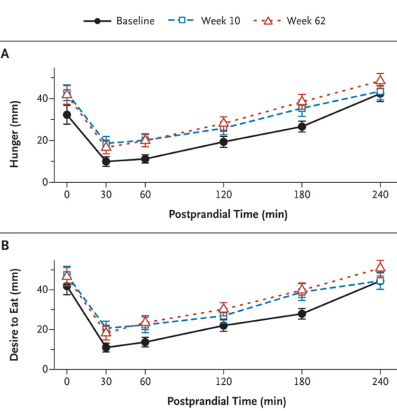FullDeplex | Tue November 29, 2011
Is it possible to stop the body “trying to get back to the baseline weight”?
I don’t know if it is safe to assume there is a “baseline weight” by this study alone, by the way. Nice article non the less.

November 27 2011
We know that 80% of the obese & overweight people who lose weight, gain most of it back within a few years. Is it because they lack the discipline or is there physiological mechanisms beyond their control that is driving the weight back.

It is now clear your body weight is regulated by your brain. There are numerous hormones in your body that controls your appetite to keep your body weight within a certain range.
Leptin: Leptin - one of the most important hormones- is primarily produced from fat cells and its circulating level is directly proportional to body fat levels.
Ghrelin: Ghrelin is released from the stomach and its primary purpose is it stimulates hunger,
Cholecystokinin(CKK): CKK is another intestinal hormon which suppresses appetite.
Eating less causes profound reductions in energy expenditure,leptin, cholecystokinin and increase in ghrelin and appetite all of which promote weight regain.
The purpose of the study was to see whether these fluctuations in these appetite regulating hormones persists with prolonged maintenance of reduced weight.If it persists, it maybe be one of the reasons why people gain back weight so easily.
The study involved 50 overweight or obese participants in a 10 week weight loss program. They measured different hormones and appetite levels before the weight loss, after the weight loss (10 weeks), and after 62 weeks of weight maintenance.
The mean weight loss was around 26 lbs after 10 weeks. There were significant changes in hormones and appetite after weight loss, and all these changes persisted even after 62 weeks.

The raph shows how hunger and 'desire to eat' were significantly higher after 10 weeks and 62 weeks compared to baseline. In short, it just means that your body is trying to get back to the baseline weight.
There are multiple compensatory mechanisms vigorously resisting weight loss in obese and overweight people.You didn't gain the weight back just because 'life got busy' or you lacked the will power.
FullDeplex | Tue November 29, 2011
Is it possible to stop the body “trying to get back to the baseline weight”?
I don’t know if it is safe to assume there is a “baseline weight” by this study alone, by the way. Nice article non the less.
Anoop | Tue November 29, 2011
Hi Fulldeplex,
Thanks for the comment
I think all this add credence to the theory of a settling point concept That obesity is genetically determined, and the more your try to move away from that range, the more the body fights back.
Bariatric surgery seems to be the only procedure which has favorable affects on appetite modulating hormones and is the only treatment which is moderately successful in obese and overweight individuals. In fact, after all this better understanding about diet and obesity, the obesity rates have been increasing. I vaguely remember a study which talks about your fat cell numbers can increase with weight gain
The question is do we have to redefine what constitutes a healthy weight?
Juarez | Tue November 29, 2011
Is it possible that these hormones, and the way that these hormones affect an individual, are influenced by childhood behaviors? IE could these hormones be controlled by epigenetic factors? If so, is anyone studying that?
I wonder if a person who loses 26 pounds in a year, not 10 weeks, has a better shot. It seems the hormones would have more time to adjust. Not that they’d ever be normal, but would likely be easier, more comfortable, to maintain?
FullDeplex | Thu December 01, 2011
How come ‘bariatric surgery seems to be the only procedure which has favorable affects on appetite modulating hormones’?
If your weight really has a set-point, this info seems to be conflicting.
Anoop | Fri December 02, 2011
Hi Juarez,
There is always an influence of environment. They say ‘Your genes makes the gun, environment pulls the trigger.’ But the genetic component is pretty strong,amounting upto 70%. It is not always that they just ‘let it happen to themselves’.
Hi Julie,
That’s a good question. I am not so sure since all these hormone levels are depended on body fat or/and the amount of calorie restriction. And if you think about 26 lbs is about 2-3 lbs per week which is not too much for obese or overweight people.
Hi Fulldeplex,
Good question. Bariatric surgery seems to make some weird changes to the body. It is now known that bariatric surgery can cure people with diabetes. People completely get off their medication after bariatric surgery! This is even before they start losing a lot of weight.
It has shown that instead of increase in ghrelin with weight loss, bariatric surgery decreases it for some reason. Bariatric surgery seems to roil the entire gut physiology.
Anoop -
I’d be interested in a study that delves into the reasons why 20% do maintain weight-loss. I know people who fit the category and I typically hear from them that simply losing the weight has changed their inclination towards food. In other words, there is less of the sort of malignant attraction to food they experienced while obese. In a sense, in curing their obesity ... they cured their obesity!
On the other hand, as a trainer myself, I am VERY circumspect about the sort of health benefits my weight-loss strategies might confer for them. Sure, health markers generally improve with weight-loss. Sure, people tend to feel and perform better. But I’ve met my fair share of individuals whom I’d consider obese but whose physicians tell them they’re as healthy as horses. This is intended to go to your question as to whether we need to redefine what constitutes ‘healthy weight.‘Certainly almost no one needs a six-pack.
Anoop | Tue December 06, 2011
Hi Dale,
Good questions.
here you go , Dale. This article talks about those people. Very interesting study. http://www.exercisebiology.com/index.php/site/articles/how_to_maintain_the_weight_lost/
I think we now know that even 5% weight loss can bring down most of your disease markers. It is also known that fitness can eliminate most of the risks of obesity even in a fat person. It is called the fitness vs fatness debate. In fact, after learning all about obesity and diets, the obesity rates are just going up. In 2010, no state had less than 20% prevalence of obesity.
Environment do play a role, but just the extreme variation of obesity in the same environment shows the hard influence of genes. Maybe overweight and obese people need not lose so much weight and come down to the normal BMI category as we think they should?
Can we change the environement? or is it just an utopian dream?
© 2008 - 2025 | Exercise Biology. All rights reserved.